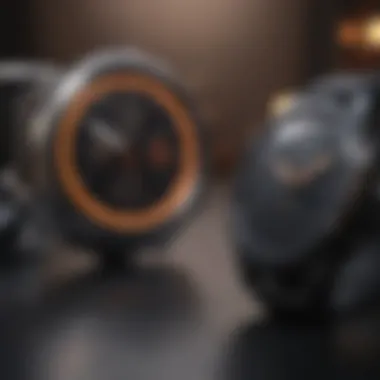Samsung Galaxy Watch 3 vs Watch 4: A Comprehensive Comparative Analysis


Overview of Samsung Galaxy Watch vs Watch
In this detailed comparison, we will dive deep into the intricate features and design elements of the Samsung Galaxy Watch 3 and Watch 4. By exploring their differences in terms of performance and overall value proposition, readers will gain a comprehensive understanding of which smartwatch aligns best with their individual needs and preferences.
Design
When scrutinizing the design aspect of the Samsung Galaxy Watch 3 versus Watch 4, a distinct evolution can be observed. The Galaxy Watch 3 maintains a more traditional and round watch face design, exuding a classic appeal. On the contrary, the Watch 4 showcases a sleeker and more modern aesthetic with a slightly larger display. While the Galaxy Watch 3 exudes elegance, the Watch 4 boasts a more contemporary look that may cater to individuals seeking a more futuristic design.
Features
Unpacking the array of features offered by both smartwatches underscores key differentiators between the Samsung Galaxy Watch 3 and Watch 4. The Galaxy Watch 3 presents a robust set of features that focus on health and fitness tracking, equipped with sensors for ECG and blood pressure monitoring. In contrast, the Watch 4 introduces new health-centered functionalities like body composition analysis, catering to users eager to delve deeper into their overall well-being. The addition of Wear OS on the Watch 4 enhances its versatility, providing users with a more seamless integration with Android smartphones.
Performance
As the comparison delves into performance metrics, it becomes evident that both the Galaxy Watch 3 and Watch 4 boast commendable processing capabilities. While the Galaxy Watch 3 demonstrates reliable performance with smooth navigation and app usage, the Watch 4, powered by a new chipset, offers enhanced speed and responsiveness. The integration of Wear OS on the Watch 4 contributes to a more fluid experience, enabling users to multitask and access apps with greater efficiency.
Value Proposition
The value proposition of the Samsung Galaxy Watch 3 and Watch 4 encapsulates their respective strengths and offerings within the smartwatch market. The Galaxy Watch 3 appeals to individuals seeking a sophisticated smartwatch with a focus on health and wellness features. Alternatively, the Watch 4 targets users looking for a more contemporary device that combines style with cutting-edge technology. Understanding the distinct value propositions of each model is crucial for consumers to make an informed decision based on their preferences and priorities.
Introduction
In the realm of smartwatches, the comparison between Samsung Galaxy Watch 3 and Watch 4 is more than a mere evaluation of two devices; it's a journey into the evolution of wearable technology. This article serves as a manual elucidating the intricacies of these timepieces, dissecting their design, features, and performance to aid in making an informed choice. Within the labyrinth of smartwatch options, understanding the disparities between these two stalwarts could be the gateway to unlocking a personalized smartwatch experience.
Embarking on this exploration, we unmask the core disparities that define the Galaxy Watch 3 and Watch 4, shedding light on the dimensions of functionality and style. The notable dichotomies packed within the casings of these devices beckon the audience to delve into the nuts and bolts of technological advancement. Unraveling the layers of innovation and practicality embedded in each watch not only uncovers their superficial disparities but also provides a glimpse into the future of wearable gadgets.
Steering away from the conventional approach of mere comparison, we aim to decode the essence of these smartwatches and their impact on the overarching zeitgeist of technology. The narrative crafted within these sections will not only inform the reader about the surface-level disparities but also serve as a compass, guiding them through the labyrinth of intricate details within the smartwatch landscape. By decoding the nuances of design, features, and performance, this exploration empowers individuals to forge a symbiotic relationship with their wearable gadget, transcending the realms of mere timekeeping to redefine personal technology interactions.
Design and Build


In the realm of wearable technology, the design and build of a smartwatch play a pivotal role in the overall user experience. When comparing the Samsung Galaxy Watch 3 and Watch 4, delving into their design and build is crucial for understanding their ergonomic functionality and aesthetic appeal. The seamless integration of form and function in these devices sets the stage for a discussion on how they fit into daily lifestyles.
Materials Used
Exploring the materials used in crafting these smartwatches unveils a tapestry of innovation and durability. The Samsung Galaxy Watch 3 boasts premium materials like stainless steel, ensuring a sleek and sophisticated appearance while maintaining robustness for daily wear. On the other hand, the Watch 4 introduces a blend of aluminum and toughened glass, emphasizing lightweight comfort without compromising on resilience. Each material choice reflects a balance between style and function, catering to diverse user preferences and lifestyles.
Dimensions and Weight
The dimensions and weight of a smartwatch contribute significantly to comfort and wearability, making it imperative to differentiate between the Galaxy Watch 3 and Watch 4. With its slimmer profile and lighter build, the Watch 4 excels in providing a minimalist feel on the wrist, ideal for extended wear throughout the day. On the contrary, the Galaxy Watch 3 strikes a balance between elegance and sturdiness, with slightly more weight that conveys a sense of robust reliability. Understanding how these aspects influence user experience is key to selecting the ideal smartwatch based on individual comfort preferences.
Water Resistance
Diving into the realm of water resistance, the Galaxy Watch 3 and Watch 4 offer varying levels of protection against the elements. The Galaxy Watch 3 presents an impressive 5 ATM water resistance rating, making it suitable for swimming and water-related activities, without sacrificing style or functionality. In contrast, the Watch 4 elevates the standard with a 10 ATM rating, ensuring enhanced durability in wet conditions, catering to fitness enthusiasts and adventurers seeking a more robust companion. Examining the nuances of water resistance opens a window into the practicality and versatility of these smartwatches in daily use.
Display
In the realm of smartwatches, the Display is a pivotal element as it serves as the primary interface between the user and the device. When comparing the Samsung Galaxy Watch 3 and Watch 4, dissecting their Display characteristics is paramount in making an informed decision. The Display plays a fundamental role in user experience, from interacting with apps to checking notifications and tracking fitness metrics. Understanding the nuances of the Display can provide insight into the overall usability and functionality of these smartwatches.
Screen Size and Resolution
The Screen Size and Resolution are fundamental determinants of visual quality and usability on a smartwatch. The Samsung Galaxy Watch 3 and Watch 4 differ in their Screen Sizes and Resolutions, impacting content clarity and display aesthetics. The larger screen size of the Watch 4 may offer a more immersive experience, especially for activities like viewing photos or reading messages. On the other hand, the higher resolution of the Watch 3 might translate into sharper images and text, enhancing overall visual appeal and readability.
Technology Used
The Technology Utilized in the Display of smartwatches significantly influences performance and power efficiency. Comparing the display technologies of the Galaxy Watch 3 and Watch 4 can shed light on factors such as color accuracy, outdoor visibility, and battery consumption. Understanding whether they employ OLED, AMOLED, or other display technologies can impact how vibrant colors appear, how well the screen performs in various lighting conditions, and how efficiently power is managed during daily usage.
Brightness and Visibility
The Brightness and Visibility of a smartwatch display are critical for seamless operation in different environments. Considering the brightness levels and visibility enhancements implemented in the Samsung Galaxy Watch 3 and Watch 4 can indicate how well these devices perform under direct sunlight or low-light conditions. A display with high brightness and excellent visibility ensures clear readability outdoors, while also optimizing battery life by intelligently adjusting brightness levels based on ambient light conditions.


Hardware and Performance
Processor and RAM
The Processor and RAM configuration of a smartwatch dictates its processing power and multitasking capabilities. The Samsung Galaxy Watch 3 and Watch 4 boast impressive processors and sufficient RAM that enable seamless navigation, quick app launching, and smooth operation. The advanced processors ensure prompt responses to commands, while ample RAM allows for running multiple apps concurrently without lag or slowdown. The enhanced processing prowess of these watches results in improved overall performance, making daily interactions swift and convenient.
Storage Capacity
When considering smartwatches, Storage Capacity is a significant aspect to ponder. The Samsung Galaxy Watch 3 and Watch 4 offer varying storage capacities to accommodate apps, music, and other data. A generous storage capacity ensures ample space for storing essential files and downloaded content, preventing the need for frequent data management. Users can download music, install apps, and update software without constantly worrying about running out of space, enhancing the user experience.
Battery Life
Battery Life is a critical factor influencing the usability and practicality of smartwatches. The Samsung Galaxy Watch 3 and Watch 4 are designed to deliver extended battery life to sustain daily usage effectively. With optimized power-saving features and efficient technology, these smartwatches can last for an extended period on a single charge. Long-lasting battery life ensures uninterrupted usage throughout the day, encompassing fitness tracking, notifications, and other functionalities without frequent recharging interruptions.
Software and Features
In this segment of the article, it is imperative to delve into the crucial aspect of software and features in the comparison between the Samsung Galaxy Watch 3 and Watch 4. The software and features of a smartwatch play a pivotal role in determining its usability, functionality, and overall user experience. When scrutinizing the software aspect, the operating system, health and fitness tracking capabilities, and the availability of smartwatch apps are significant elements to consider. The software ecosystem of a smartwatch directly impacts its performance, customization options, and compatibility with other devices. Additionally, the features offered by the software, such as notifications, voice assistants, and other functionalities, contribute to the overall value proposition of the device.
Operating System
The operating system is the backbone of any smartwatch, dictating its interface, usability, and app compatibility. When comparing the Samsung Galaxy Watch 3 and Watch 4, their respective operating systems, Tizen OS and Wear OS, come into play. Tizen OS, Samsung's proprietary operating system, is known for its smooth performance, intuitive interface, and robust app ecosystem. On the other hand, Wear OS, developed by Google, offers seamless integration with Android devices, extensive Google services support, and a wide range of third-party apps. The choice between Tizen OS and Wear OS can significantly impact the user experience and overall functionality of the smartwatch.
Health and Fitness Tracking
Health and fitness tracking have become pivotal features in modern smartwatches, catering to users' growing interest in monitoring their well-being and physical activities. The Samsung Galaxy Watch 3 and Watch 4 boast advanced health and fitness tracking capabilities, including heart rate monitoring, sleep tracking, activity tracking, and blood oxygen level measurements. These features enable users to gain valuable insights into their health metrics and workout performance, empowering them to make informed decisions about their lifestyle and fitness goals. The accuracy, precision, and real-time monitoring capabilities of the health and fitness tracking functionalities set the Samsung Galaxy Watch 3 and Watch 4 apart in the smartwatch market.
Smartwatch Apps
The availability of diverse and useful smartwatch apps enhances the functionality and versatility of a smartwatch, transforming it into a multifaceted device that caters to various needs and preferences. Both the Samsung Galaxy Watch 3 and Watch 4 offer access to a wide range of smartwatch apps, ranging from fitness and health apps to productivity tools and entertainment services. The quality and quantity of smartwatch apps available for a specific platform can significantly influence its appeal and utility to users. The compatibility, performance, and usability of smartwatch apps on the Samsung Galaxy Watch 3 and Watch 4 are key considerations for users looking to leverage additional functionalities beyond standard features.


Connectivity and Compatibility
In the realm of smartwatches, the aspect of Connectivity and Compatibility holds paramount importance, shaping the user experience and functionality. When comparing the Samsung Galaxy Watch 3 and Watch 4, delving into their connectivity features becomes crucial. This section analyzes the intricacies of how these devices interact with external sources and networks.
Bluetooth and Wi-Fi
Bluetooth and Wi-Fi capabilities are pivotal in establishing seamless connections for smartwatches. The Samsung Galaxy Watch 3 integrates advanced Bluetooth technology, ensuring swift pairing with compatible devices for data transfer and notifications. Additionally, its Wi-Fi connectivity amplifies its versatility by enabling direct internet access without relying solely on Bluetooth tethering.
Smartphone Integration
The synergy between a smartwatch and smartphone is indispensable for synchronized functionality. When evaluating the Samsung Galaxy Watch 3 and Watch 4, understanding how well they integrate with smartphones is key. These devices leverage sophisticated algorithms to sync seamlessly with smartphones, offering streamlined access to calls, messages, and notifications.
Third-Party App Support
Enhanced functionality on smartwatches often stems from third-party app compatibility. Both the Samsung Galaxy Watch 3 and Watch 4 support a myriad of third-party apps, enriching the user experience with diverse functionalities. By examining the extent and efficiency of third-party app integration, users can gauge the adaptability and innovation each smartwatch offers.
Price and Value
When delving into the realm of smartwatches, understanding the intricate balance between price and value is paramount. In this comparison between the Samsung Galaxy Watch 3 and Watch 4, the segment of price and value assumes a pivotal role in assisting prospective buyers in making an informed decision. The consideration of price and value encapsulates not only the monetary aspect of the purchase but also the return on investment that each smartwatch offers.
Firstly, the price of a smartwatch can often be a deciding factor for many consumers, signaling the level of financial commitment required. The Samsung Galaxy Watch series presents a spectrum of prices, with features and capabilities correlating directly with the cost. Understanding the pricing structure helps individuals align their budget with the functionalities they desire, ultimately leading to a satisfactory purchase.
Moreover, evaluating the value offered by each smartwatch unveils a deeper layer of analysis. The value proposition extends beyond the mere monetary value, encompassing the benefits, features, and conveniences that accompany the purchase. For tech enthusiasts and fitness aficionados alike, the value lies in the seamless integration of health tracking features, connectivity options, and battery life that enrich the user experience.
In this comparison, the Samsung Galaxy Watch 3 and Watch 4 shine in distinct ways, with each presenting unique value propositions. The Samsung Galaxy Watch 3 may appeal to users seeking a blend of style and functionality, offering a comprehensive suite of features at a competitive price point. On the other hand, the Watch 4 caters to users prioritizing cutting-edge technology and advanced health tracking capabilities, justifying its slightly higher price tag.
Conclusion
In this culmination of the Samsung Galaxy Watch 3 versus Watch 4 exploration, the importance of reaching a decision stands paramount. Making an informed choice between these two cutting-edge smartwatches is not just a mere selection process; it's a meticulous evaluation of features, design, performance, and overall value. Understanding the nuances that differentiate these devices is crucial for users looking to invest in a premium wearable tech experience.
To delve into the conclusion of this comparative analysis is to acknowledge that the significance of choosing between the Samsung Galaxy Watch 3 and Watch 4 transcends mere speculation. It delves into the realm of personal preference, priorities in functionality, and the user's everyday needs. This decision-making juncture is where the journey of technology meets individuality, where practicality merges with style, and convenience aligns with sophistication.
Assessing the conclusive notes of this in-depth comparison unveils the subtle yet impactful differences that can sway the preference of discerning users. Each feature scrutinized, every specification evaluated, and all aspects considered contribute to a holistic understanding that paves the way for a well-founded decision-making process. As the curtain falls on this analytical narrative, users are armed with insights that empower them to select a smartwatch that seamlessly integrates into their lifestyle and enhances their daily routine.
In essence, the conclusion section serves as the pinnacle of discernment, consolidating all previously analyzed facets into a coherent viewpoint. It orchestrates a symphony of information, presenting a harmonious blend of details that guide users towards a choice that aligns perfectly with their unique requirements and aspirations.
Ultimately, the Conclusion segment of this article acts as a gateway to clarity, equipping readers with the knowledge and understanding necessary to navigate the vast landscape of smartwatch options. It encapsulates the essence of informed decision-making, emphasizing the importance of meticulous research, critical evaluation, and individual preference in selecting the ideal wearable companion, be it the Samsung Galaxy Watch 3 or the Watch 4.















